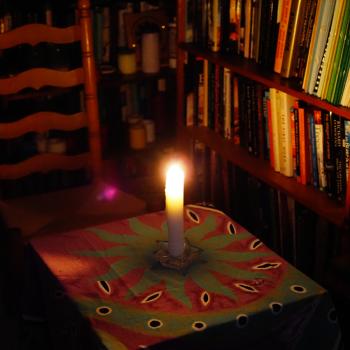Therefore, blessed are they who humble themselves without being compelled to be humble; or rather, in other words, blessed is he that believeth in the word of God, and is baptized without stubbornness of heart, yea, without being brought to know the word, or even compelled to know, before they will believe.
Alma seems to be saying that it is better to "freely" believe the word of God - that is, to believe without being compelled by fact to know that it is true. The idea is like Jesus's ]admonition to Thomas the doubter: "Blessed are those who have not seen, and yet have believed." But Alma introduces freedom into the category of belief: seeing is a kind of compulsion, and thus belief without sight is a kind of emancipation. I think Dutcher and others who make his argument - that God conceals direct evidence of his works so that we can choose belief freely - can plausibly point to this passage for support.
The question remains, however: why is belief freely chosen superior to knowledge gathered through rational processes of observation and inference? On this question, as on so many others, LDS scholar Terryl Givens offers the strongest answer. Givens embraces the idea that God deliberately withholds signs of the divine hand, and he ]suggests a characteristically elegant and thoughtful justification for that extraordinary claim:
I am convinced that there must be grounds for doubt as well as belief in order to render the choice more truly a choice-and, therefore, the more deliberate and laden with personal vulnerability and investment. ... One is, it would seem, always provided with sufficient materials out of which to fashion a life of credible conviction or dismissive denial. We are acted upon, in other words, by appeals to our personal values, our yearnings, our fears, our appetites, and our egos. What we choose to embrace, to be responsive to, is the purest reflection of who we are and what we love. That is why faith, the choice to believe, is, in the final analysis, an action that is positively laden with moral significance.
The strengths of Givens' argument here are clear: it reflects the uplifting optimism of LDS teachings on human nature and destiny, our robust confidence in human capacity to choose freely and well, and the centrality of the human subject to the purpose and ends of the Christian cosmos. Most of all, Givens, ever the wizard of paradox, offers a faith-affirming interpretation of doubt itself: doubt is recast as the necessary condition for real faith, itself recast as "the choice to believe." In a world where an invisible Aslan asks us, against our every observation and instinct, to step out into a dark void—which is to say, in our world—this is a gift indeed.
(This is the first of a two-part exploration. Check back next week for the exciting conclusion to my argument against the idea that faith is a chosen belief!)





